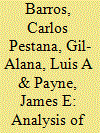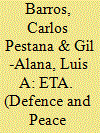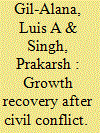|
|
|
Sort Order |
|
|
|
Items / Page
|
|
|
|
|
|
|
| Srl | Item |
| 1 |
ID:
101414


|
|
|
|
|
| Publication |
2011.
|
| Summary/Abstract |
This study examines the time series behaviour of oil production for OPEC member countries within a fractional integration modelling framework recognizing the potential for structural breaks and outliers. The analysis is undertaken using monthly data from January 1973 to October 2008 for 13 OPEC member countries. The results indicate there is mean reverting persistence in oil production with breaks identified in 10 out of the 13 countries examined. Thus, shocks affecting the structure of OPEC oil production will have persistent effects in the long run for all countries, and in some cases the effects are expected to be permanent.
|
|
|
|
|
|
|
|
|
|
|
|
|
|
|
|
| 2 |
ID:
090389


|
|
|
|
|
| Publication |
2009.
|
| Summary/Abstract |
In the last 15 years, terrorist activity in the Basque Country has substantially decreased and strategies have changed. Whilst the type of killings has become more specialised (politicians, reporters, etc.), a new phenomenon based on urban guerrilla tactics, and called in Basque 'kale borroka' (street fighting), has emerged, creating an atmosphere of violence in the streets. The contribution of this paper is threefold. First, we create a daily measure of the level of violence in the area. Second, we examine if police action and the repressive policy measures adopted by the government since 2001 have been effective in reducing the intensity of violence. Third, we investigate whether the level of violence has had an effect on the stock market index in the Basque Country. The results, based on daily data from 1 July 2001 to 15 November 2005, suggest that the only effective measure to reduce violence was the banning of Herri Batasuna (HB), the radical party close to ETA supporters. Moreover, there was a decrease in the stock market index as a consequence of the violence in the area during the period under analysis.
|
|
|
|
|
|
|
|
|
|
|
|
|
|
|
|
| 3 |
ID:
069234


|
|
|
| 4 |
ID:
111388


|
|
|
|
|
| Publication |
2012.
|
| Summary/Abstract |
This study examines the degrees of time persistence in U.S. total renewable energy consumption using innovative fractional integration and autoregressive models with monthly data from 1981:1 to 2010:10. The results indicate that renewable energy consumption is better explained in terms of a long memory model that incorporates persistence components and seasonality. The degree of integration is above 0.5 but significantly below 1.0, suggesting nonstationarity with mean reverting behavior. The presence of long memory behavior (persistence) in renewable energy consumption suggests that random shocks may very well move renewable energy consumption from pre-determined target levels for a period of time.
|
|
|
|
|
|
|
|
|
|
|
|
|
|
|
|
| 5 |
ID:
144785


|
|
|
|
|
| Summary/Abstract |
Using recent econometric techniques based on fractional integration, we find that developing countries recover their economic growth faster than developed countries in response to a shock. Following this methodology, we find that longer civil conflicts are associated with a faster recovery process. We further investigate this issue by exploring correlations with components of GDP, military spending, institutions and aid and find heterogeneous effects of these channels by duration of conflict. Higher government spending is correlated with faster recoveries post longer conflicts, and higher consumption spending is linked to faster recoveries following shorter conflicts. Military spending appears to be driving the government expenditure that makes countries recover from longer conflicts. More democratic institutions are associated with faster recoveries post short wars but slower recoveries following long wars.
|
|
|
|
|
|
|
|
|
|
|
|
|
|
|
|
|
|
|
|
|